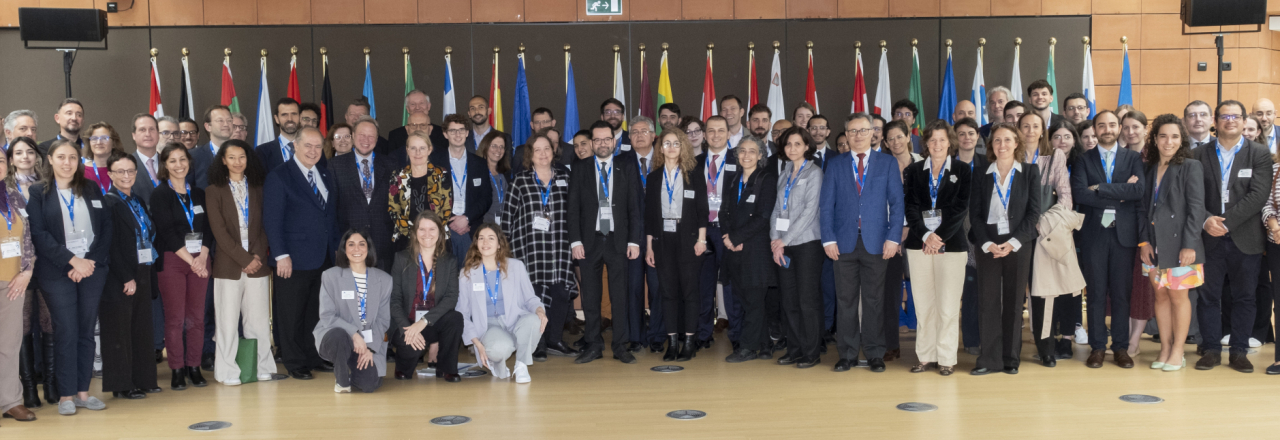
EuroMeSCo Annual Conference 2024: Addressing Key Challenges in the Euro-Mediterranean Region
The EuroMeSCo Annual Conference 2024 took place on May 16th and 17th at the European Economic and Social Committee in Brussels, bringing together around 140 practitioners, researchers, and policymakers. Themed “Mediterranean Foresight: Exploring Future Scenarios of Cooperation,” the conference aimed to address the pressing issues and future cooperation prospects in the Euro-Mediterranean region.
The conference opened with remarks from distinguished speakers, including Thomas Wagnsonner from the EESC, Henrike Trautmann from the European Commission, Carmen Magariños from the Spanish Ministry of Foreign Affairs, and Ambassador Senén Florensa, Executive President of the European Institute of the Mediterranean (IEMed). Their speeches set the tone for a comprehensive dialogue on the complexities facing the region.
One of the central themes was maritime security, discussed during the first plenary session chaired by Harry Tzimitras, Director of the PRIO Cyprus Centre. Experts like Joseph Bahout, Héloïse Fayet, Luisa Puccio, and Patrick Simonnet examined the strategic importance of the Mediterranean Sea for global trade and highlighted the growing tensions and security challenges from the Gibraltar Strait to the Persian Gulf. Bahout pointed out, “Most of the non-Mediterranean powers play a disruptive role in the Mediterranean.”
Migration was another critical topic, explored in the second plenary session. Speakers discussed the challenges and politicization of migration policies in the region. Tarek Megerisi remarked, “The EU has exchanged its leverage for the externalization of migration control.” They emphasized the need for long-term, cooperative solutions to manage migration effectively.
The afternoon session on the first day featured the Multistakeholders Platform, focusing on communication, perceptions, and narratives in Euro-Mediterranean Relations. Chaired by Emmanuel Cohen-Hadria from IEMed, this session included insights from Birgit Loeser of the EEAS and Sergio Carranza from the Spanish MFA. Discussions focused on shifting narratives and the importance of effective communication strategies to strengthen regional relationships. Alessandro Accorsi highlighted the region’s information challenges: “The MENA region has a serious and structural information problem. Yet, let’s not use disinformation as a fig leaf. It is Europe’s policy failures that allow actors to weaponize information.” Shada Islam, political commentator and analyst underscored the vital role of journalism: “Journalists have to continue to speak truth to power; otherwise, Euro-Mediterranean relations are in real danger.”
The second day’s discussions began with a plenary session on the future of economic interdependence in the Mediterranean. Panellists explored how recent global crises have impacted economic relations and highlighted opportunities for deeper integration and cooperation. Hamza Meddeb noted, “Serious plans are lacking; the EU can’t be an external growth engine for this region.” Adel Hamaizia also pointed out how a genuinely private private sector would undermine the status quo and allow for growth in the region.
The conference concluded with three foresight working sessions that delved into specific scenarios for the region’s future. The session on the future of the Palestinian issue, facilitated examined potential future scenarios for the Israel-Palestine conflict and the roles of the EU and neighbouring countries. Secondly, the session on new connectivity politics in the Eastern Mediterranean, facilitated by experts from the Centre for European Policy Studies (CEPS), discussed strategic connectivity projects and their implications for regional stability and cooperation. Lastly, a scenario-building session led by Adel Hamaizia engaged participants in simulations to anticipate future political and economic developments affecting Euro-Mediterranean relations.
The EuroMeSCo Annual Conference 2024 successfully brought together diverse voices to address the multifaceted challenges of the Euro-Mediterranean region. Through comprehensive discussions and collaborative foresight, participants worked towards identifying proactive strategies and fostering deeper cooperation to navigate the complexities of the future.
Watch the first day’s livestream HERE
Watch the second day’s livestream HERE


